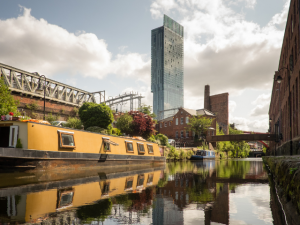
Academic Spotlight: Cecilia Wong, Professor of Spatial Planning
Cecilia Wong is Professor of Spatial Planning at the University of Manchester, and the Director of the Spatial Policy & Analysis Lab within the Manchester Urban Institute. In her academic spotlight, she shares with us her background, what attracted her to work at Manchester and her area of research.
On your background
Like many of our postgraduate students, I was an overseas student travelling all the way from Hong Kong to study a Master’s degree in Town and Regional Planning in Liverpool. As the pioneer of modern town planning, the UK was ‘the place’ to acquire a professional qualification. With an Overseas Development Administration Scholarship from the British government, I ended up spending my entire career in the UK, especially in the northern cities. I always said that I am an honorary northerner!
After graduation, I became a town planner for Cleveland County Council and then a researcher at Newcastle University. These early experiences of working in local government, as well as doing research projects for Whitehall and various government agencies, have been invaluable in shaping my long-term career as an academic amphibian. Academics are often seen as living in an ivory tower, but my research has a strong applied focus. It has been wonderful to have a job that allows me to apply my research skills to inform policy and practice and to see changes and impact on the ground, as well as training the next generations of planners. A university Planning Department is a natural habitat for me to fulfil such ambitions.
On your decision to join Manchester and your research
I have been working at Manchester University since 1993 and have witnessed the ups and downs of the University and the city. Both the city and the University have always been very cosmopolitan and welcoming to international staff and students, even way back in the 1990s. While the city and the University are thriving in many ways, I always think that their potential have not been fully realised; which could be partly explained by the entrenched spatial inequality of government funding and resource allocations. As the Director of the Spatial Policy & Analysis Lab within the Manchester Urban Institute, my colleagues and I are keen to understand the relationship between people and place and to identify the cumulative spatial impacts caused by deliberate or unintentional policy actions.
In recent times, we have successfully secured research grants to carry out commuting flow analysis in the UK; looking at ecological urbanisation and community well-being in Beijing; and are currently examining the relationship between planning, transport and public health in Greater Manchester. The UK 2070 Commission is another example to demonstrate genuine collaborative effort across academia and the policy community to address the entrenched problem of spatial and regional inequalities in the UK. It is through this collective effort that the Commission has been making real impact to influence the government’s levelling up agenda during this very testing time.
Someone once asked me in a job interview ‘what are you going to do in twenty years’ time if you become a professor at 36?’. My answer was that I hoped to continue doing exciting and interesting things. I am glad that this remains true now that twenty years have passed by. I enjoy working with my very dedicated colleagues who are keen to innovate the curriculum by bringing cutting edge ideas to our teaching as well as working as a team to overcome challenges brought by the pandemic. I am happy to work evenings, weekends and give up some holiday, knowing my energetic and creative young colleagues in the SPA-Lab are bubbling with new research ideas and keen to crack research problems.
On your experience working with students
The most enjoyable thing as an academic is also seeing our passion for research and learning passing onto our students. I am the convenor of an Infrastructure Planning module in which it is great to know that our students and I are all keen to have guest speakers from different infrastructure sectors to learn about the latest developments in the fast moving practice world. It is even more pleasing when my students tell me that they want to have a career in the field.
Over the years, many of our graduates have gone on to occupy very influential and senior positions in the planning field around different parts of the world. The other side of the coin is that we also need to have some of these talents trained to become academics. The good news is that some of our best master’s students also successfully secure scholarships to embark on PhD study and work on very exciting research projects.
The city of Manchester, which I call a ‘can-do’ city, is an ideal laboratory for anyone who is interested in learning and researching spatial planning and urban development. Our Department, nested in an interdisciplinary learning environment and well-connected with professional practice across the region, provides a vibrant and welcoming place for students who want to pursue a career in planning.






0 Comments